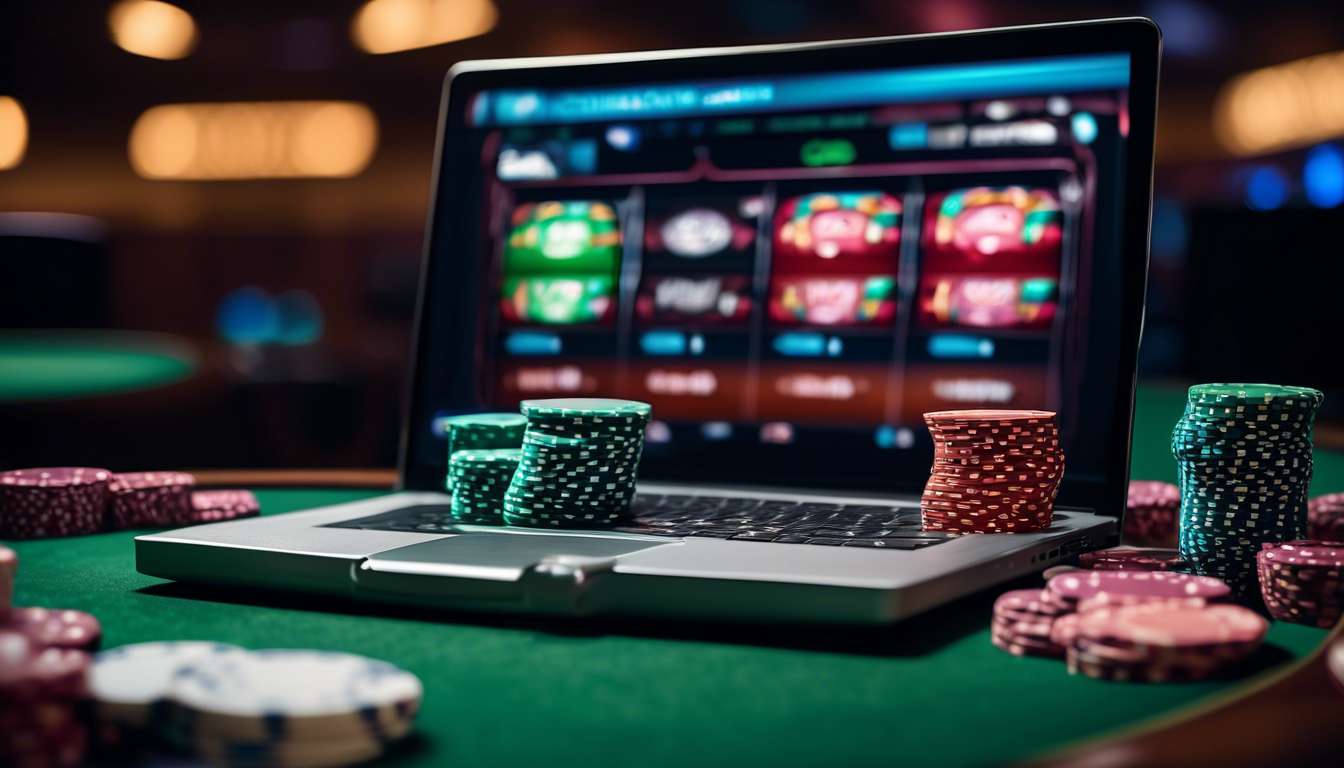In the exhilarating world of online poker, we often find ourselves immersed in a sea of terms and jargon that can be both intriguing and bewildering. As fellow enthusiasts of this strategic and thrilling game, we know how crucial it is to understand the language of poker to truly appreciate and master it.
That’s why we’ve compiled the ultimate list of online poker terms and their meanings, designed to demystify the lingo and enhance our collective poker experience. Whether we’re seasoned players or newcomers eager to join the virtual tables, having a solid grasp of these terms will undoubtedly elevate our game.
In this article, we’ll explore the essential vocabulary, from the basics to the more advanced terminology, ensuring we’re all on the same page when it comes to the nuances of online poker.
Let’s dive in and enrich our poker lexicon together, turning confusion into clarity and strategy into success.
Blinds
In poker, blinds are mandatory bets that players must place before any cards are dealt. These bets are crucial for stimulating action and creating an initial pot.
- Small Blind
- Big Blind
These ensure there’s always something to fight for, drawing us into the thrill of competition.
Once the blinds are posted, anticipation builds as we await the flop. It’s at this stage that the game truly begins to take shape, and our strategies start to unfold. We often find ourselves deciding whether to:
- Play conservatively
- Go all-in
This decision is driven by the excitement of potential winnings and camaraderie at the table.
Navigating the dynamics of blinds helps us feel connected to the poker world and each other. Together, we share:
- The highs of going all-in
- The lows of watching the flop change everything
We’re in this thrilling ride together.
Flop
As the dealer reveals the flop, we suddenly gain valuable insights into our potential hand and the overall direction of the game. The flop represents the first three community cards placed face-up on the table, and it’s a pivotal moment in any hand of poker.
Together, we watch eagerly, calculating how these cards interact with our hole cards and considering whether we should:
- Continue playing
- Raise
- Perhaps even go all-in
It’s a shared moment of anticipation where our collective understanding deepens, binding us together in the thrill of the game.
The blinds have already set the pace, and now the flop gives us the information we need to decide our next move. This moment is not just about the cards but about reading the room, the players, and their potential hands.
We find ourselves part of an intricate dance, where the flop is our cue to either:
- Take bold action
- Proceed with caution
We are always united in the pursuit of victory.
Turn
As the dealer places the turn card on the table, we reassess our strategies with this crucial fourth community card that could shift the balance of the game. The turn follows the flop, adding depth to our decision-making. Our earlier reads on opponents and their reactions to the flop now face the litmus test of the turn.
Key Decisions:
- Are we ready to raise the stakes?
- Should we hold back and play it safe?
Facing those who are already committed through the blinds, we must decide whether:
- Our current hand stands strong.
- It’s time to prepare for an all-in move.
The turn can either bolster our confidence or prompt us to reconsider our position. It’s not just about the cards but the camaraderie and shared experience of reading the table together. We’re all part of this high-stakes dance, and the turn is where our collective skills and instincts come to the forefront.
River
The River Card: The Final Decision
The river card, the final community card, seals our fate and demands our ultimate decision in this poker round. We’ve journeyed through the blinds, the pre-flop, the flop, and the turn, and now we’re here—on the brink of victory or loss. The river is where our strategies culminate, where our carefully considered plays come to fruition or falter.
Camaraderie and Tension
It’s here that we feel the camaraderie and tension among players, each of us assessing our hands with a shared understanding of the stakes involved. Some might decide to go All-In, putting their chips and their trust in the strength of their cards. Others may tread cautiously, considering whether the community cards favor their hand or not.
The Shared Experience
As we face the river, we collectively hold our breath, knowing that this card can change everything. It’s a moment that connects us all in the shared experience of anticipation, skill, and chance that defines the game of poker.
All-In
In poker, going "All-In" is a high-stakes move where we wager every chip in our stack. It’s a bold statement, a moment when we declare our confidence or desperation. This decision can shift the dynamics of the table, whether we’re pushing our chips before the Flop or after seeing those first three community cards.
Facing the Blinds, we might decide it’s time to go All-In, especially if we’re short-stacked and need to make a move. It’s a chance to either double up or face elimination. Together, we weigh:
- Our odds
- The strength of our hand
- The psychology of our opponents
When one of us goes All-In, it echoes a shared experience of risk and reward. It’s a move that can unite us in anticipation, as we collectively hold our breath, waiting to see what the Flop will bring.
As a group, we understand the thrill and camaraderie of an All-In moment.
Check
In poker, when we choose to "Check," we’re opting not to bet, effectively passing the action to the next player while remaining in the hand. It’s a strategic moment where we maintain our place in the game without committing more chips.
When we’re sitting in the early stages of a round, like when only the blinds have been posted, checking allows us to see the flop without further investment. This sense of anticipation and camaraderie among players builds a shared excitement.
Checking also provides us with an opportunity to gather information on our opponents’ intentions. If someone decides to go All-In after we’ve checked, it forces us to reconsider our strategy and evaluate our hand’s strength. At this moment, we’re all connected by the choices we make.
Our decision to check can create a ripple effect, influencing the actions of those around us. It’s a subtle yet powerful tool in our poker arsenal, uniting us in our shared pursuit of victory.
Raise
Raising in poker is a bold move to increase the stakes and challenge our opponents. When we’re in the heat of a game, a raise can signal strength or test the resolve of those playing against us. It’s a strategy that fosters a sense of unity and belonging among players, as we’re all engaged in this high-stakes game together.
We might choose to raise after the blinds are posted, leveraging our position to seize control of the pot. As the flop is revealed, a well-timed raise can shift the dynamic and force others to rethink their strategies. It’s about reading the room and acting with confidence.
Sometimes, we’re so sure of our hand that raising isn’t enough—we decide to go all-in, putting everything on the line. This move unites us in the thrill of the gamble, knowing we’ve committed fully to the outcome, win or lose.
Ante
Before the cards are even dealt, we all contribute an ante to the pot, setting the stage for the round ahead. This shared commitment binds us together, creating a sense of community and anticipation.
Unlike the blinds, which are forced bets by specific players, the ante is a universal gesture, ensuring everyone has a stake in the action. It keeps the energy alive and the pot enticing before we even see the flop.
As we navigate the hand, the ante reminds us that we’re all in this together. When someone goes all-in, it’s not just their risk; it’s a shared moment of collective tension.
The ante’s presence means everyone has a piece of the pie, making each decision more thrilling and inclusive. We may start with a modest contribution, but it builds a foundation of camaraderie and competition, reminding us that poker isn’t just a game of cards—it’s a shared journey.
What is the difference between a cash game and a tournament in online poker?
In online poker, the difference between a cash game and a tournament lies in their structure and objectives.
Cash Games:
- Players buy in with real money.
- Play as long as they want.
- Can cash out their chips at any time.
Tournaments:
- Have set buy-ins.
- Players compete to win a share of the prize pool.
Both formats offer unique challenges and strategies for players to enjoy.
How can I tell if an online poker site is trustworthy and secure?
To determine if an online poker site is trustworthy and secure, look for the following key indicators:
-
Licensing and Regulation
- Check for proper licensing from reputable authorities.
-
Encryption
- Ensure the site uses encryption to safeguard personal and financial information.
-
Reviews and Certifications
- Read reviews and check for certifications to gain valuable insight into the site’s trustworthiness.
By following these steps, you can play confidently on a secure and trustworthy online poker platform.
What are the best strategies for improving my online poker skills?
When looking to boost online poker skills, focusing on mastering the basics is key. This includes:
- Hand rankings
- Position play
Another effective strategy is to regularly review gameplay through hand histories and seek feedback from more experienced players.
Consistent practice is crucial. Additionally, staying up to date with poker strategies and maintaining a positive mindset are essential for continuous improvement in the online poker journey.
Conclusion
The Ultimate List of Online Poker Terms and Their Meanings
Now that you’re familiar with key terms, you’ll be able to navigate the virtual poker table with confidence. Here are some of the essential terms:
-
Blinds: These are mandatory bets placed before any cards are dealt, typically by the two players to the left of the dealer.
-
Flop: The first three community cards dealt face-up on the table.
-
Turn: The fourth community card dealt face-up.
-
River: The fifth and final community card dealt face-up.
-
All-In: When a player bets all their remaining chips.
-
Check: To pass on betting while staying in the game, provided no one has bet before you in that round.
-
Raise: To increase the current bet amount.
-
Ante: A small bet all players must make before a hand is dealt.
Tips for Success
-
Practice Regularly: Keep practicing and honing your skills to become a master of the game.
-
Stay Informed: Continuously learn about new strategies and terms.
Good Luck!
May the cards be ever in your favor!

